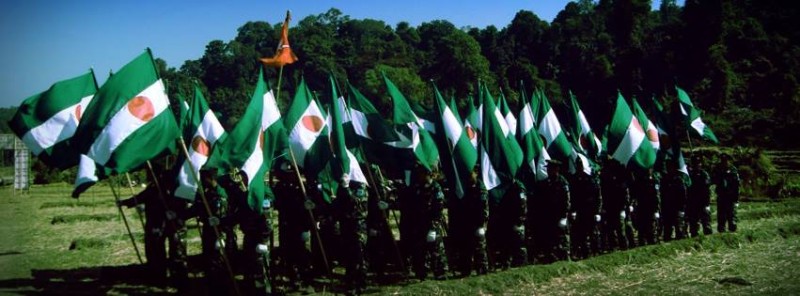The TNLA is the armed insurgent wing of the Palaung State Liberation Front (PSLF), a political organization who advocates for the self-determination of the Palaung people, an ethnic minority found in Burma’s Shan, China’s Yunnan Province and Northern Thailand.
Armed members of the group are reportedly collecting “taxes” from vehicles on the highway, depending on their size: US$64 (K100,000) for small cars and over $300 for larger vehicles.
“I’ve heard that vehicles refusing to pay the tax like mine will eventually have to pay K200,000 [$130]. I went to Nam Um village, but when I got there, I heard gunfire, so I came back here,” a truck driver told the Myanmar Times.
After paying the tax, the TNLA issues drivers a receipt. If drivers do not have a receipt, armed men at checkpoints will charge them more, according to one driver. One TNLA leader said that drivers holding receipts will not be bothered.
For decades, the TNLA, along with three other ethnic insurgent groups that comprise the Northern Alliance, have been engaged in vicious armed conflict with the government army, officially called the Tatmadaw.
A 2017 report by Amnesty International estimates that nearly 100,000 people have been displaced by the conflict, and alleges that many actions carried out by the Tatmadaw constitute war crimes.
Armed groups in conflict areas often finance their operations through illegal trade of wood, drugs, oil or people.
Taliban, al Qaeda and its affiliates in Pakistan, Central Asia, Africa and Latin America have been profiting from illegal drug business, mostly Afghan heroin.
Islamic extremists have been helping Colombian guerrillas smuggle cocaine through Africa on its way to European consumers, Reuters reported.
Myanmar was the world’s second-largest opium producer in 2015, with an estimated 98 percent that year grown in Shan and Kachin states, where the conflict is the strongest.
However, a 2017 report by the United Nations Office on Drugs and Crime says opium production has scaled back in recent years, with a 25 percent decrease recorded in those two states between 2015 and 2017.
The TNLA is known for its opposition to opium poppy cultivation, destroying fields, heroin refineries, and meth labs whose profits are funding the same government-backed militias the TNLA are fighting.
However, the TNLA for its part seems to be making money from various types of extortion.
Last July, more than 700 locals from the village of Kham Teng fled following alleged extortion of more than $45,500 from villagers by the TNLA.
Just last month reports surfaced that armed groups were demanding money from trucks carrying buffaloes and cattle in the area around Kyaukme Township.
“If they [buffalo and cattle traders] refuse to or are unable to pay the money, the armed groups will shoot them,” a local from Kyaukme said.



